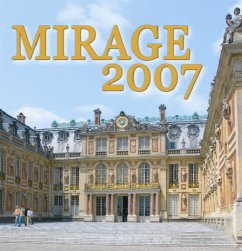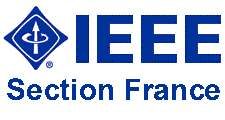|
Computer Vision / Computer Graphics Collaboration Techniques and Applications March, 28-30 2007 INRIA Rocquencourt, France http://acivs.org/mirage2007/ |
|
|
|
Mirage 2007 is an international conference with focus on Computer Vision/Computer Graphics collaboration techniques involving image analysis/synthesis approaches. In the domain of Computer Vision, this analysis by synthesis collaboration may take the form of model-based approaches for which the analysis, recognition or understanding process does not rely on the data only but is linked to the optimization of a parametric model introduced A PRIORI.
In the field of Computer Graphics, this thematic refers to image-based approaches which found the modeling, animation, lighting or rendering process on the analysis of real pre-existing data in order to gain in productivity or in realism. In both cases, this extraction and synthesis collaboration can be iterative and conducted in a loop: the synthesized information laying the foundations for a better characterization that will in turn enable the synthesis step. Augmented Reality is a direct application of this collaboration . Authors are encouraged to submit papers on theoretical, computational, experimental or industrial aspects of model-based image analysis and image-based model synthesis.
Mirage 2007 was held in the new Jacques-Louis Lions conference room of the INRIA Rocquencourt research centre on March, 28-30 2007. The INRIA Rocquencourt research centre is located at a short drive of the historic Versailles castle.
The proceedings are now available online on Springer's website.
Invited presentations
There will be invited papers by:- Peter Eisert, Heinrich-Hertz-Institut. Image-based Rendering for 3D Scene Analysis and Synthesis. Abstract.
- Adrian Hilton, University of Surrey, UK. Video-based modelling and animation of people. Abstract.
Topics include (but are not limited to)
- Model-based imaging and analysis
- Image-based modeling and 3D reconstruction
- Data driven animation
- Image and video-based lighting and rendering
- Model-based vision approaches
- Model-based indexing and database retrieval
- Model-based object tracking in image sequences
- Model-based image and shape analysis
- Model-based video compression techniques
With applications in the field of
- Human/Computer interfaces
- Video-games and entertainment industry
- Media productions from and for films, broadcasts and games
- post-production, computer animation, virtual effects
- Realistic 3D simulation, virtual prototyping
- Multimedia applications, multimedia database classification
- Virtual and augmented reality
- Medical and biomedical applications
Venue and transportation
The Symposium will take place in the new Jacques-Louis Lions conference room within the INRIA Rocquencourt research centre. The center can be easily reached by car, by train or by bus, either by taking public transportations or the free INRIA facilities. The different routes are fully detailed on the INRIA special webpage.
Registration fees do not include lodging and travel expenses. Some information on accommodation in Paris or Versailles is available on the Paris and Versailles web sites.
In case of any problem as well as for additional information, do not hesitate to get in touch with the conference office which will operate during the whole conference.
Conference languages
English
Paper submission and review process
Prospective authors should prepare a full paper and submit it electronically. The paper should consist of 8-12 pages in A4 format and should conform to the style guidelines outlined on the Mirage 2007 website. LaTeX style sheets (preferred), MSWord templates and detailed information on the submission process can be found on the Mirage 2007 website.
All submissions will be reviewed by at least 2 members of the Program Committee; additional reviewers will be consulted if necessary. The papers should provide sufficient background information and should clearly indicate the original contribution. They should state and discuss the main results and provide adequate references.
Confererence proceedings
Accepted papers will be published in the LNCS series of SPRINGER VERLAG.
Important deadlines
| November 1, 2006 | Full paper submission | |
| December 15, 2006 | Notification of acceptance | |
| January 15, 2007 | Camera-ready papers due | |
| February 1, 2007 | Registration deadline for authors of accepted papers | |
| March 1, 2007 | Early registration deadline | |
| March 15, 2007 | Late registration deadline | |
| March, 28-30 2007 | Mirage 2007 |
Mirage 2007 Registration
Due to security policy, the number of seats at the conference is strictly limited: thus, early registration is strongly recommended. Online registration should be available soon. Registration is also possible by filling out the registration form available as a pdf file and a Word document. Please send the form to the address mentioned in the form. Fees will be fully returned for any written cancellation received up to 8 days before the conference. No refund will be made in respect of cancellation received after this date.
Registration fees include free access to any exhibition within the conference, a copy of the conference proceedings, lunches and coffee breaks; a social program will also be available. Registration fees do not cover lodging and travel expenses.
Note that one registration fee must be paid for each accepted paper.
Conference chair
André Gagalowicz, INRIA Rocquencourt, Le Chesnay, France.
Conference Program co-chairs
Cédric Guiard, THALES, Paris, France.
Emanuele Trucco, Heriot-Watt University, Edinburgh, UK.
Organising committee
Florence Barbara, INRIA Rocquencourt, Le Chesnay, France.
André Gagalowicz, INRIA Rocquencourt, Le Chesnay, France.
Chantal Girodon, INRIA Rocquencourt, Rocquencourt, France.
Wilfried Philips, Ghent University, Ghent, Belgium.
Program Committee
Ken Anjyo, OLM Digital, Inc, Tokyo, Japan.
Bruno Arnaldi, IRISA, Rennes, France.
Yuri Bayakovski, Moscow State University, Moscow, Russia.
Jacques Blanc-Talon, DGA, France, Arcueil, France.
Volker Blanz, Max-Planck Institut für Informatik, Saarbrücken, Germany.
José Braz, Polytechnic Institute of Setúbal, Setúbal, Portugal.
Antonio Camurri, University of Genova, Genova, Italy.
Adrian Clark, University of Essex, Colchester, United Kingdom.
Ernst Dickmanns, University of the Bundeswehr, Munich, Hofolding, Germany.
Peter Eisert, Heinrich-Hertz-Institut, Berlin, Germany.
Reyes Enciso, USC, Los Angeles, USA.
Alexandre Francois, University of Southern California, Los Angeles, USA.
Andrea Fusiello, Università degli Studi di Verona, Verona, Italy.
André Gagalowicz, INRIA Rocquencourt, Le Chesnay, France.
Sidharta Gautama, TELIN, Ghent University, Ghent, Belgium.
Andrew Glassner, Coyote Wind, Seattle, USA.
Michael Gleicher, University of Wisconsin, Madison, USA.
Michael Goesele, University of Washington, Seattle, USA.
Oliver Grau, BBC, Tadworth, UK.
Radek Grzeszczuk, Nokia Research Lab, Palo Alto, USA.
Cédric Guiard, THALES, Paris, France.
Peter Hall, University of Bath, Bath, United Kingdom.
Adrian Hilton, University of Surrey, Guildford, United Kingdom.
Hyung Soo Kim, Seoul National University, Seoul, Korea.
Reinhard Koch, Christian-Albrechts-Universität Kiel, Kiel, Germany.
Ivana Kolingerova, University of West Bohemia, Plzen, Czech Republic.
Tosiyasu Kunii, Kanazawa Institute of Technology, Tokyo, Japan.
Hendrik Lensch, Max-Planck-Institut für Informatik, Saarbrücken, Germany.
Ales Leonardis, Ljubljana University, Ljubljana, Slovenia.
J.P. Lewis, Stanford University, Stanford, USA.
Zicheng Liu, Microsoft, Redmond, USA.
Takashi Matsuyama, Kyoto University, Kyoto, Japan.
Wojciech Mokrzycki, University of Podlasie, Siedlce, Poland.
Toshio Moriya, Hitachi, Ltd., Kawasaki, Japan.
Vittorio Murino, Università degli Studi di Verona, Verona, Italy.
Heinrich Niemann, Erlangen, Erlangen, germany.
Kazunori Okada, San Francisco State University, San Francisco, USA.
Joern Ostermann, University of Hannover, Hannover, Germany.
Jean-Claude Paul, Tsinghua University, Peking, China.
Dietrich Paulus, University of Koblenz, Koblenz, Germany.
Wilfried Philips, Ghent University, Ghent, Belgium.
Dan Popescu, CSIRO, Sidney, Australia.
John Robinson, University of York, Heslington, United Kingdom.
Christian Roessl, INRIA Sophia-Antipolis, Sophia-Antipolis, France.
Bodo Rosenhahn, Max Planck Institut, Saarbrücken, Germany.
Robert Sablatnig, Vienna University of Technology, Vienna, Austria.
Wladislaw Skarbek, Warsaw University of Technology, Warsaw, Poland.
Franc Solina, University of Ljubljana, Ljubljana, Slovenia.
Daniel Thalmann, EPFL, Lausanne, Switzerland.
Holger Theisel, Max Planck Institut für Informatik, Saarbrücken, Germany.
Christian Theobalt, Max Planck Institut für Informatik, Sarrbrücken, Germany.
Emanuele Trucco, Heriot-Watt University, Edinburgh, UK.
Thomas Vetter, Basel university, Basel, Switzerland.
Wenping Wang, The University of Hong Kong, Hong Kong, China.
Harry Wechsler, George Mason University, Fairfax, USA.
Konrad Wojciechowski, Institute of Automation, Gliwice, Poland.
Hau San Wong, City University of Hong Kong, Kowloon Hong Kong, China.
Geoff Wyvill, University of Otago, New Zealand.
Cha Zhang, Microsoft Research, Redmond, USA.
Tatjana Zrimec, University of South Wales, Australia.





